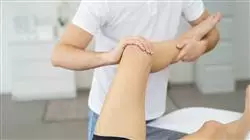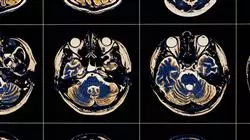University certificate
The world's largest faculty of medicine”
Introduction to the Program
This program will generate a sense of confidence in the performance of the physiotherapist's professional practice, which will help you grow personally and professionally”

This is a time of great advances in the field of neuroscience, as well as rehabilitative medicine as a science, which forces specialists to have to update their knowledge both about the functioning of the nervous system, as well as how to assess and therapeutically approach a person with ABI, since each injury is different and will manifest itself in a different way in each patient.
This Professional master’s degree in Rehabilitation Medicine in ABI Management aims to be a compendium of the evidence and the most up-to-date scientific knowledge about the nervous system and its rehabilitation when it is injured. As a result, it is a Professional master’s degree capable of specializing the rehabilitation physician who has never dealt with people with ABI and, nevertheless, is interested in having a professional future with this type of patients.
Likewise, the professional who is already a neurological rehabilitation physician, whether or not dealing with ABI, will find a space to update their knowledge and reach super-specialization in this group of patients.
On the other hand, by understanding so much information about neuroscience and functionality, it can be a useful tool for the physiotherapist whose patient is not specifically one suffering from an ABI or a neurological pathology, but who nevertheless needs to know the ins and outs of the nervous system to better understand and address the injury or therapeutic need of the patient.
In this Professional master’s degree, a space has also been reserved to talk about ABI in pediatric age, since it represents an even greater challenge for the rehabilitation physician due to the specific characteristics of the nervous system and the organism according to the neurodevelopment acquired and to be acquired depending on the age at which the injury occurs.
Update your knowledge through the Professional master’s degree in Rehabilitation Medicine in Acquired Brain Injury Management"
This Professional master’s degree in Rehabilitation Medicine in Acquired Brain Injury Management contains the most complete and up-to-date scientific program on the market. The most important features include:
- The development of more than 75 practical case studies presented by experts in Rehabilitation Medicine in Acquired Brain Injury Management
- The graphic, schematic, and practical contents with which they are created provide scientific and practical information on the disciplines that are essential for professional practice
- New developments on the role of the Rehabilitation Physician
- Contains practical exercises where the self-evaluation process can be carried out to improve learning
- Algorithm-based interactive learning system for decision-making in the situations that are presented to the student
- Special emphasis on evidence-based Rehabilitation Medicine and research methodologies in Rehabilitation Medicine in Acquired Brain Injury Management
- Theoretical lessons, questions to the expert, debate forums on controversial topics, and individual reflection assignments
- Content that is accessible from any fixed or portable device with an Internet connection
This Professional master’s degree may be the best investment you can make when selecting a refresher program, for two reasons: in addition to updating your knowledge in Rehabilitation Medicine in Acquired Brain Injury Management Management, you will obtain a certificate endorsed by TECH Global University"
It includes in its teaching staff professionals belonging to the field of Rehabilitation Medicine in Acquired Brain Injury Management, who bring to this program their work experience, in addition to recognized specialists belonging to leading scientific societies.
Its multimedia content, developed with the latest educational technology, will allow the professional a situated and contextual learning, that is, a simulated environment that will provide an immersive learning programmed to prepare in real situations.
The design of this program focuses on Problem-Based Learning, by means of which the Rehabilitation Physician must try to solve the different professional practice situations that arise throughout the course. For this purpose, the Rehabilitation Physician will be assisted by an innovative interactive video system created by renowned experts in the field of Rehabilitation Medicine in Acquired Brain Injury Management who have extensive teaching experience.
This Professional master’s degree offers education in simulated environments, which provides an immersive learning experience designed to prepare for real-life situations"

It includes clinical cases to bring the program as close as possible to the reality of medical care"
Why study at TECH?
TECH is the world’s largest online university. With an impressive catalog of more than 14,000 university programs available in 11 languages, it is positioned as a leader in employability, with a 99% job placement rate. In addition, it relies on an enormous faculty of more than 6,000 professors of the highest international renown.

Study at the world's largest online university and guarantee your professional success. The future starts at TECH”
The world’s best online university according to FORBES
The prestigious Forbes magazine, specialized in business and finance, has highlighted TECH as “the world's best online university” This is what they have recently stated in an article in their digital edition in which they echo the success story of this institution, “thanks to the academic offer it provides, the selection of its teaching staff, and an innovative learning method aimed at educating the professionals of the future”
A revolutionary study method, a cutting-edge faculty and a practical focus: the key to TECH's success.
The most complete study plans on the university scene
TECH offers the most complete study plans on the university scene, with syllabuses that cover fundamental concepts and, at the same time, the main scientific advances in their specific scientific areas. In addition, these programs are continuously being updated to guarantee students the academic vanguard and the most in-demand professional skills. In this way, the university's qualifications provide its graduates with a significant advantage to propel their careers to success.
TECH offers the most comprehensive and intensive study plans on the current university scene.
A world-class teaching staff
TECH's teaching staff is made up of more than 6,000 professors with the highest international recognition. Professors, researchers and top executives of multinational companies, including Isaiah Covington, performance coach of the Boston Celtics; Magda Romanska, principal investigator at Harvard MetaLAB; Ignacio Wistumba, chairman of the department of translational molecular pathology at MD Anderson Cancer Center; and D.W. Pine, creative director of TIME magazine, among others.
Internationally renowned experts, specialized in different branches of Health, Technology, Communication and Business, form part of the TECH faculty.
A unique learning method
TECH is the first university to use Relearning in all its programs. It is the best online learning methodology, accredited with international teaching quality certifications, provided by prestigious educational agencies. In addition, this disruptive educational model is complemented with the “Case Method”, thereby setting up a unique online teaching strategy. Innovative teaching resources are also implemented, including detailed videos, infographics and interactive summaries.
TECH combines Relearning and the Case Method in all its university programs to guarantee excellent theoretical and practical learning, studying whenever and wherever you want.
The world's largest online university
TECH is the world’s largest online university. We are the largest educational institution, with the best and widest online educational catalog, one hundred percent online and covering the vast majority of areas of knowledge. We offer a large selection of our own degrees and accredited online undergraduate and postgraduate degrees. In total, more than 14,000 university degrees, in eleven different languages, make us the largest educational largest in the world.
TECH has the world's most extensive catalog of academic and official programs, available in more than 11 languages.
Google Premier Partner
The American technology giant has awarded TECH the Google Google Premier Partner badge. This award, which is only available to 3% of the world's companies, highlights the efficient, flexible and tailored experience that this university provides to students. The recognition as a Google Premier Partner not only accredits the maximum rigor, performance and investment in TECH's digital infrastructures, but also places this university as one of the world's leading technology companies.
Google has positioned TECH in the top 3% of the world's most important technology companies by awarding it its Google Premier Partner badge.
The official online university of the NBA
TECH is the official online university of the NBA. Thanks to our agreement with the biggest league in basketball, we offer our students exclusive university programs, as well as a wide variety of educational resources focused on the business of the league and other areas of the sports industry. Each program is made up of a uniquely designed syllabus and features exceptional guest hosts: professionals with a distinguished sports background who will offer their expertise on the most relevant topics.
TECH has been selected by the NBA, the world's top basketball league, as its official online university.
The top-rated university by its students
Students have positioned TECH as the world's top-rated university on the main review websites, with a highest rating of 4.9 out of 5, obtained from more than 1,000 reviews. These results consolidate TECH as the benchmark university institution at an international level, reflecting the excellence and positive impact of its educational model.” reflecting the excellence and positive impact of its educational model.”
TECH is the world’s top-rated university by its students.
Leaders in employability
TECH has managed to become the leading university in employability. 99% of its students obtain jobs in the academic field they have studied, within one year of completing any of the university's programs. A similar number achieve immediate career enhancement. All this thanks to a study methodology that bases its effectiveness on the acquisition of practical skills, which are absolutely necessary for professional development.
99% of TECH graduates find a job within a year of completing their studies.
Professional Master's Degree in Rehabilitation Medicine in Acquired Brain Injury Management
According to data presented by the World Health Organization, acquired brain injury represents the first cause of disability in adults. Due to the high incidence and impact of this pathological condition, the rehabilitation processes developed for the approach of patients with this type of injury have gained great relevance and prominence in recent times. This situation has been reflected in the growing interest on the part of health care clinics of various types for the labor insertion of professionals specialized in this area. Understanding the need for academic updating that accompanies the increase of occupational opportunities in the sector, at TECH Global University we have prepared our Professional Master's Degree in Rehabilitation Medicine in Acquired Brain Injury Management. In this postgraduate program we will delve into the new alternatives of physiotherapeutic intervention in the management of cases of acquired brain injury in childhood. Similarly, it will delve into the modernization of the following aspects: the identification of the different methods of neurological examination used in the assessment of a patient with acquired brain injury; and knowledge of new systems and orthopedic devices used in support of the rehabilitation process of the patient.
Study anProfessional Master's Degree in Rehabilitation Medicine in Acquired Brain Injury Management
The possible complications that can often hinder the rehabilitation process of a patient with acquired brain injury require for its proper resolution the presence of professionals with a high level of knowledge. In our Professional Master's Degree you will approach rehabilitation medicine from the identification of the different fields of evolution of the sector, contemplating the multiple and varied alternatives of intervention in the area. In this way, the professional's update is prioritized with respect to the following topics: the different alternatives implemented in the management of pain in individuals with acquired brain damage; and the possibilities present in the implementation of hydrotherapy and electrotherapy techniques in the physiotherapeutic processes of rehabilitation of patients with acquired brain damage.







